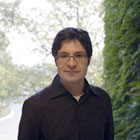Tag: Science
-
Health
Nanowire arrays can detect signals along individual neurons
Opening a whole new interface between nanotechnology and neuroscience, scientists at Harvard University have used slender silicon nanowires to detect, stimulate, and inhibit nerve signals along the axons and dendrites of live mammalian neurons.
-
Science & Tech
Measuring one of the universe’s building blocks
Only a few people think deeply about electrons. One is Gerald Gabrielse, Leverett Professor of Physics at Harvard University. In the past 20 years, he has discovered new things about them, things that even Albert Einstein never knew. And he’s trained a half-dozen young Ph.D.s in the business of how subatomic particles make the universe…
-
Health
Mental casualties of Vietnam War persist
More than 30 years after the end of the war in Vietnam, the effect of lingering stress on Americans who fought there continues to cause stress among researchers.
-
Health
Heat waves deadliest for blacks, diabetics
Heat waves, like the one that scorched the country in July, are more deadly for some people than for others. Poor blacks and diabetics fare the worst. As you might guess, extreme heat is also hard on the elderly. But as you might not guess, extreme cold has a greater impact.
-
Science & Tech
Deep-sea sediments could safely store man-made carbon dioxide
An innovative solution for the man-made carbon dioxide fouling our skies could rest far beneath the surface of the ocean, say scientists at Harvard University. They’ve found that deep-sea sediments could provide a virtually unlimited and permanent reservoir for this gas that has been a primary driver of global climate change in recent decades, and…
-
Campus & Community
Women far behind in patent awards
Women who strive to make new biological discoveries at universities are awarded less than half the number of patents than their male colleagues.

-
Health
Meditation found to increase brain size
People who meditate grow bigger brains than those who don’t. Researchers at Harvard, Yale, and the Massachusetts Institute of Technology have found the first evidence that meditation can alter the physical structure of our brains. Brain scans they conducted reveal that experienced meditators boasted increased thickness in parts of the brain that deal with attention…


